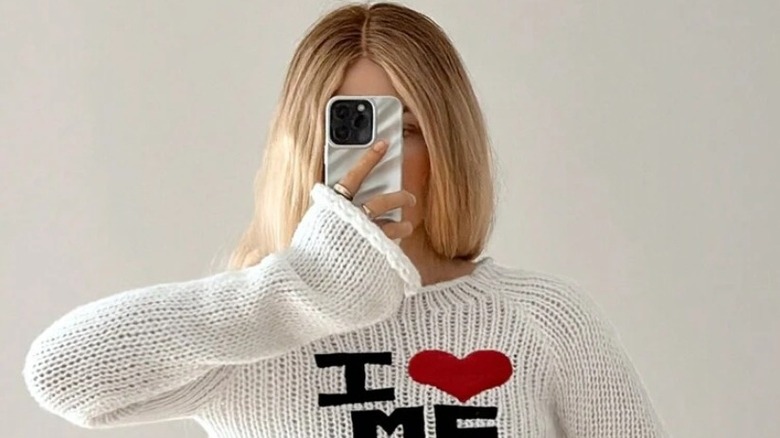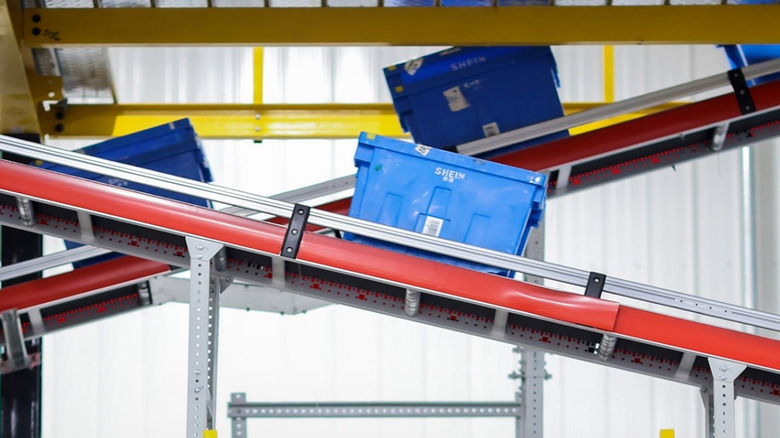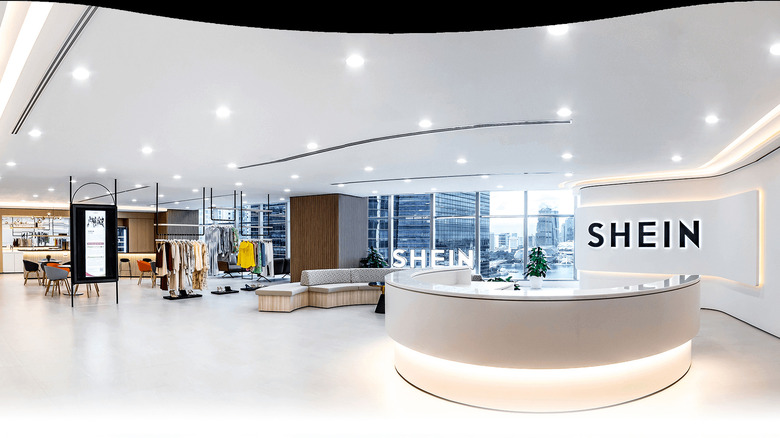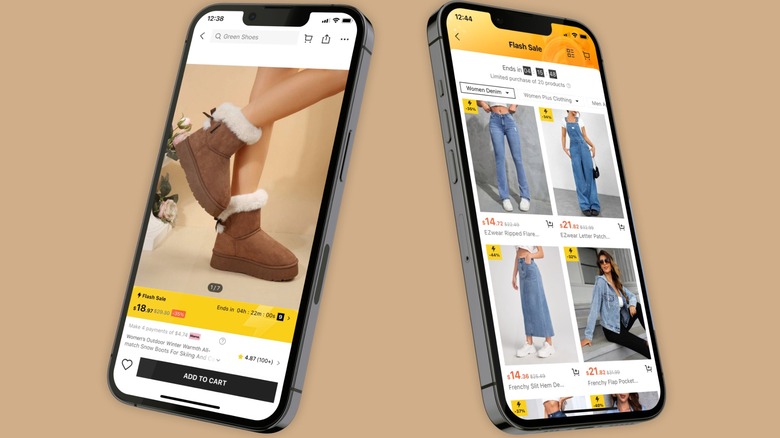The Shady Side Of SHEIN
Shein is well-known as one of many popular cheap clothing apps, and it's been wildly successful. Who hasn't bought a little special something off the affordable retail site? Of course, plenty of people who have purchased from Shein have negative things to say about it, and it turns out there might be a shady side to the company.
No company is perfect, but there are a number of clear red flags with Shein, from its reportedly super-secretive business practices to questions over the sourcing of its designs and more.
Thanks to all the rumors swirling, and some confirmed facts, Shein is a hotly debated topic these days. As it turns out, Shein might be one of those online accounts you should bid farewell to forever. If you're already familiar with the shady side of Temu, these revelations might not be that surprising, but either way, beware the potentially shady side of Shein.
Shein seems to be super-secretive
When it comes to transparency, it would seem that Shein is lacking in that area. Like most companies, the website offers steep discounts, free shipping, and deals in all categories of clothing, electronics, accessories, household goods, and beauty products, among others. There's also a lot that isn't said, according to sources like Statista.
On its website, Shein states it is committed to making the "beauty of fashion" available to everyone. It says it uses "on-demand manufacturing technology," has an "agile supply chain," and keeps inventory waste low while offering affordable products. Further, Shein notes that it has almost 10,000 employees worldwide (58% of whom are women) and that it sells to over 150 countries.
In discussing the company's founding, Shein says it has "alternative processes and technologies" that help it evolve in the fashion world. Part of that technology is proprietary software, says the brand, and a "digital supply chain" is at the core of the business model.
That all sounds great, but how much does it really say about the brand? As it turns out, not much. Per Statista, "Shein has thus far not disclosed official financial statements, as well as information regarding their supply chain and working conditions." Although Shein has apparently not released financial statements (though it did release some worker salary information — more on that later), Statista points out that the company is valued at over 100 billion USD.
Shein might be feeding its influencers falsehoods
Fast fashion sites often enlist influencers to help advertise their products, and Shein is no different. Sites like Temu offer affiliate programs where promoters can earn commissions, and many brands also work directly with influencers in ad campaigns that don't always feel like ad campaigns.
However, there are ethics questions involved with social media personalities promoting brands, especially when they don't clarify that it's a paid partnership. Shein was in the headlines when an expert called it out for influencers' reportedly uninformed commentary.
Chinese factory expert John Pabon broke down one influencer's comments about Shein, disputing claims that he says Shein fed to influencers, such as the fact that Shein has a "very low carbon footprint" when compared with other fast fashion brands. Pabon disputed that claim with a graphic showing Shein's carbon footprint was dozens of times larger than that of other brands like Boohoo, Zara, and H&M.
Pabon pointedly stated that Shein is using influencers to attempt to greenwash its brand, all the while telling those influencers falsehoods. It's not the influencers' faults, Pabon stated, but Shein's. Fast fashion as a whole, Yahoo! Life wrote, could make up half the world's carbon pollution in a few years. The publication pointed to Shein and similar companies as the primary culprits, though Shein has apparently promised to work on reducing its emissions. Unfortunately, it will take time to make that change, and misinformation is being spread in the meantime.
Shein wouldn't exist without AI
Artificial Intelligence (AI) might be one of modern society's coolest tools, but it can also be problematic. You might agree with that conclusion if you've ever been misled by a photo or video that claims to be something it's not.However, AI has many positive uses, like automating boring and repetitive tasks for humans and supporting people with disabilities. On the flip side, the use of AI can also be bad for business.
According to various media, Shein relies heavily on AI for its supply chain. LAist describes Shein's pattern-identification algorithms as the primary tool for predicting trends and consumer demand. A company that only — or in large part — exists due to AI is not necessarily a good thing, especially if you ask real human designers (more on them later).
However, experts agree that the use of AI can also make emissions worse. Their evidence? The near-doubling of Shein's carbon dioxide emissions from year to year as it apparently cranked up the use of AI.
At the same time, Shein's head of global strategy and corporate affairs told one media outlet that AI wasn't central to the company's operations. Months later, he gave a presentation that included references to heavy AI use. With 38% of Shein's climate footprint stemming from transportation pollution, according to LAist, there's a lot left to divvy up among the company's processes — including AI.
Businesses say Shein steals their designs
Consumers do take risks when ordering from sites like Temu and Shein, and one of those might be the fact that a small business is losing revenue because of it. One of the most prevalent concerns that show Shein's shady side is the fact that countless designers have claimed the company stole their designs.
Shein reportedly lists 6,000 new items per day, so where are all those product ideas coming from? Small businesses and independent designers say the ideas are coming straight from their products.
One case that LAist reported on was a designer who filed a lawsuit against Shein alleging that the company's AI tools basically scrape the internet for, among other things, clothing design ideas. Fast Company pointed out in its analysis of fast fashion that not only does the practice impact the environment by way of companies' carbon footprints, but cheap fashions also wind up in landfills.
In contrast, smaller designers often lament their designs being "stolen" by Shein (and other companies) partly because of the time and energy that goes into perfecting a design, sourcing materials, and assembling the product. For example, one designer claimed on X that Shein stole their design, pointing out that the company's machine-made sweater was a duplicate of something that took them hours to design and crochet.
Multiple designers, including the designer who created the crocheted sweater, filed a federal racketeering lawsuit against Shein in 2023.
Shein might be the biggest polluter in fast fashion
As LAist reported, Shein's own reports showed that it doubled its carbon dioxide emissions from 2022 to 2023, a fact that Shein does not appear to deny. The publication then labeled Shein "officially" the biggest polluter in fast fashion.
While other brands saw increased revenue and lowered emissions during similar periods, as pointed out by LAist, Shein seemed to disagree that its track record was a problem. Shein's representative reportedly pushed back against the accusation that Shein is creating more waste as it expands. The representative replied that increased growth was not "antithetical," or incompatible, with sustainability.
Shein did relate to media representatives that it was pursuing different transportation methods for its wares, such as using cargo ships more to reduce emissions. However, it's unclear how long it might take to change the tide, though the company's timeline is at least partly planned out for the next 25 years.
On Shein's website, the company reiterates its claim to "decarbonize" its supply chain, with a goal of reducing emissions by 25% by 2030. Shein noted, "Our absolute emissions grew from 9.17 million metric tons of CO2e in 2022 to 16.68 million metric tons of CO2e."
The company states it will commit to zero emissions by 2050. To achieve this goal, Shein lists multiple action points, including adopting solar energy through rooftop panels, localizing procurement, and employing hybrid and electric vehicles as part of its transportation lineup.
Shein products could be toxic
Although Shein is not the only problematic fast fashion retailer these days, it tends to be one of the big two or three. Case in point? In a review of items sold by Shein, Temu, and AliExpress, authorities found toxic substances in all of them. Just Style reported that authorities in Seoul, South Korea, announced that in a review of 144 products, all brands had multiple products that failed legal standards.
Some of the findings reportedly included levels of phthalates 229 times higher than the law permits (shoes from Shein) and lead levels 11 times higher than the law allows (shoes from Temu). Hats from Shein were said to test positive for formaldehyde.
Just Style also described a similar test from months prior, when the Seoul Metropolitan Government reported unsafe levels of phthalates in children's shoes from Shein. In response to the publication of the government's findings, Shein issued a statement that said it works with third-party testing agencies to make sure suppliers comply with its safety standards.
Given that Shein sells its products in more than 150 countries, it seems that the company would have to adhere to the requirements for each of those countries, depending on how products are processed upon arrival to their destinations.
It's worth noting that the United States Consumer Product Safety Commission does not appear to have strict requirements for testing all categories of products, so it's unclear what requirement Shein may have to meet in the U.S.
Shein is accused of breaking the law
It's not surprising that Shein has been accused of breaking the law, given that the company has already been accused of stealing designers' ideas and giving influencers incorrect and misleading information. However, one court case involves not one but two fast fashion companies, with Shein going up against Temu with interesting allegations.
In 2023, Shein sued Temu, accusing the parent company of breach of copyright. In what might sound like a familiar case to those pushed by small business owners, Temu was accused of using other companies' photos for products on its site. Shein seemed to be alleging that Temu stole images from other companies, perhaps including Shein.
Temu hit back with allegations of Shein having violated a competition law in Britain, though Reuters noted that Shein denies that claim. Temu, for its part, filed in court documents the complaint that Shein was "flooding" the platform with "unwarranted" copyright infringement notices to the point where it was disrupting regular business. The conflicting issues between the companies could impact both businesses.
The legal battle has only just begun for this particular case, as the cases are expected to be heard in London courts in 2026. Perhaps complicating the case in terms of public perception, Temu is also being investigated for breaking rules related to the sale of illegal products. Shein, on the other hand, has other, different issues at play.
Shein suppliers reportedly work 75 hours per week
Many companies face allegations of overworking employees, and Shein is no different. In an investigation that alluded to the shady side of working for Shein, MSN reported that Shein was accused of overworking suppliers. An investigation suggested that some workers were toiling 75 hours per week, with only one or no days off during the week.
The investigation explored working conditions at multiple Shein supplier sites in Guangzhou, China, and the conditions were allegedly poor. An advocacy group reported that workers worked excessive overtime hours and had poor conditions, including "piecework wages." After the initial report, Shein said it was going to spend $15 million remedying many of the issues the report brought to light.
Shein said it would take over three or four years to upgrade hundreds of factories, with the first 30 projects completed by the end of 2022. Among other things, Shein stated it would ensure employees that work for Shein suppliers would receive safe and comfortable work environments and be treated "fairly and with respect."
A new survey of Shein supplier workers suggested "little progress," MSN noted, and Shein did not seem happy with the follow-up, saying it did not "recognize many of the allegations." Shein also pushed back based on the fact that the survey was a relatively small sample size, given how many (thousands) facilities Shein oversees. Shein also stated monthly salaries were far above workers' local minimum wage, but did not list the hours worked.
Shein's working conditions might not be great
MSN's review of two separate advocacy group investigations didn't reflect well on Shein's operating procedures, and it seems there was more to uncover about the poor working conditions in Shein suppliers' factories. While it's not clear how much control Shein has over its suppliers' facilities, judging by the $15 million commitment to make improvements, it seems that Shein can make its suppliers jump through whatever hoops they want.
That said, a BBC review of how Shein factories operate gave more details than MSN's interpretation of the advocacy group Public Eye's findings. Some interviewees stated they worked 12-hour days, that time not including break periods, and the second round of surveys suggested wages had not changed in the interim.
Further, the people interviewed by Public Eye claimed that if they made mistakes, they had to fix them on their own time. Workers also noticed an increase in surveillance cameras, which Shein could have installed to enforce its worker protections. However, Public Eye's findings also reported workers bringing toddlers into factories, people smoking inside (against regulation), and teenagers who may not have been authorized to work packaging products.
In an act of apparent transparency, Shein's salary report is available on the retailer's website. However, as various publications have pointed out, there are no hours stipulated for the monthly salaries. BBC and MSN both estimated that once hours worked are factored in, Shein workers are making less than their local minimum wage.
Shein allegedly mishandled customer data
A data breach can happen to just about any company, but Shein's data practices leave plenty to be desired, according to the U.S.-China Economic and Security Review Commission (USCC). Tech Radar reported that the USCC declared that both Shein and competitor Temu "pose a risk" to consumers in the United States.
Shein is one of the most popular free iPhone apps, but how they use consumer data is not entirely clear. What is clear, though, is the fact that Shein asks consumers to share data not just with its app but from other apps, like social media. Shein uses discounts and specials on its products to entice consumers to offer up their data, which the USCC looked at negatively. It's unclear whether consumers can opt-out from those offers or protect their data in other ways.
Shein's parent company also faced a $1.9 million fine in 2022 for not securing consumers' credit card data and other information. The fine, which came from New York State, suggests that Shein has some work to do with regard to protecting consumer data.
Despite ongoing concerns over consumer privacy, generally raised by the government, people continue to download the Shein app worldwide. Statista's data compilation shows increasing numbers of consumers downloading the app, with 261.94 million downloads in 2023. While Statista's 2024 data was incomplete, Shein was on track toward more than 217 million app downloads for the year as of November 2024.
Shein's business model discourages competition
One last potentially shady element of Shein? The fact that its business model discourages competition. If Temu's lawsuit against the competing brand is any indication, Shein could be engaged in some business practices that are frowned upon, if not illegal. While the courts have yet to decide on many of the cases, the fact that Shein has the lowest prices of any comparable retailer speaks volumes.
Plus, part of the reason why Shein's prices are so cheap is because the company discards so much clothing. Not only do the pieces not last — according to the aforementioned sources like MSN, LAist, and others — but shoppers may not bother to send in consumer-funded returns. At a return fee of $7.99 per item (after one free return per order), returns are not cheap.
Thus, clothing and other products may end up in landfills. Many will also end up there after only a few uses, according to various media outlets. Shein's materials have also come under fire — in some cases literally — as children's clothing didn't meet flammability standards in one investigation in Canada.
Unfortunately, Shein's angle toward eliminating the competition may result in shady practices from other brands. It could, however, inspire some companies to jump on the budget train. Amazon just launched Amazon Haul in an apparent bid to compete with fast fashion brands, and it likely won't be the only online retailer to do so.











